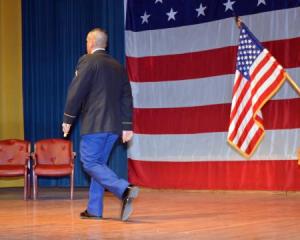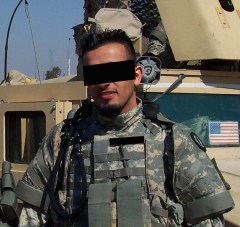U.S. troops man a checkpoint in Baghdad's Sadr City neighborhood, 2008.
Shortly after the invasion of Iraq in 2003, I started my very first job as a combat linguist for the coalition forces in Iraq, in support of Operation Iraqi Freedom.
Able to speak English and Arabic, I thought this would help my people and coalition forces understand each other and get over the language barrier.
Working in the most dangerous areas in the capital Baghdad on Haifa Street, Adhamya and Sadr City gave me lots of experience, in both my civilian, and my life now, as a U.S. soldier. I was their favorite translator and they would get mad if another platoon borrowed me for a mission because they were short on linguists.
Near the end of the winter in 2007, violence started to escalate again in the east side of Baghdad especially in Sadr City, the Jaysh Almahdi Militia stronghold.
One early morning I was attached to the 630th MP Co. from Bamberg, Germany. We went out to set check points at the main roads that led to Sadr City, searching for insurgents, weapons, and information.
I was positioned at the head of the checkpoint that we set on one of the main streets. I directed traffic and informed civilians that we were there to help establish security in the area.
While I was talked to the locals and directed them to the coalition checkpoint, a driver in a grey BMW quickly approached. He said he was in a hurry and needed to pass through quickly. I noticed both he and his passenger were nervous! I asked him few question and to notice his reaction and replies.
“Do you have any weapons in the car?” I asked him.
He replied, “No….uh, no, we don’t.”
His passenger was getting extremely nervous and I noticed his face turned red.
So I told them, “Don’t worry, we will let you pass through but I need you to dismount the car just for a routine check.”
The driver refused to comply.
In the meantime, I noticed the passenger was trying to push something down between the seat and center console of the car, so I asked him what was in there.
The driver replied, “That’s my son, he’s not doing anything.”
I told the man not to answer for him, and asked the same question again to the young passenger. He said “nothing.”
I was still translating every word in the conversation to my NCOs and lieutenant. My officer and I insisted the man and his son get out of the car and he said, “I have a pistol for personal protection.”
I asked him if he had a weapon permit, he said no. I told him, “It’s going to be okay, all I need is the weapon to be handled to me carefully and exit the car where the soldiers and I can see your hands–same for the passenger.”
They exited the car and two soldiers escorted them away. I began to search the car with another soldier and we found another pistol between the passenger seat and the center console. We secured it and continued searching.
I found an AK-47 under the passenger seat with two, full magazines, and the soldier working with me found an AK-47 under the driver seat. I went to talk to the driver and asked him about all these weapons and he said he needed them protect himself and his son.
“Do you have anything else in the car,” I asked. When he said no, we escorted the man to open the trunk of his car. That’s when we found three hand grenades, ammunition and more AK-47 magazines, and other weapons.
I started to look into his ID cards and papers that he had on him. He had two fake ID cards with two different names, and had a fake ID stating he was an officer in the Iraqi army. I searched his cell phone and found appalling pictures of people being tortured, dead bodies and Improvised Explosive Devices.
The patrol commander ordered to restrain the man and his son while we called for a special unit to pick them up. Later on, my unit informed me that the man was a key leader in the militia and was responsible for killing many U.S. service members and Iraqi soldiers.
With that incident, I felt more important to my unit and to my country. I know I helped save lives by stopping this insurgent and others like him.

Jacob walks off the stage carrying his certificate as an Army motor transport operator at Fort Leonard Wood, Mo., March 15.
During my seven years of service as a translator, I was held hostage twice by local militias, barely making it out the second time.
In 2010, I was granted a Special Immigrant Visa to the United States and later enlisted in the Texas Army National Guard, where I finished my high school education through the GED Plus Program and completed Basic Combat Training and Advanced Individual Training as a motor transport specialist.
Even though I served alongside U.S. Soldiers and wore the same uniform before, actually being a U.S. soldier is probably the best feeling ever. I’m looking forward to serving my new country for years to come.
“Jacob” – his name isn’t being disclosed to protect his identity – became a fully-qualified U.S. soldier March 15.


